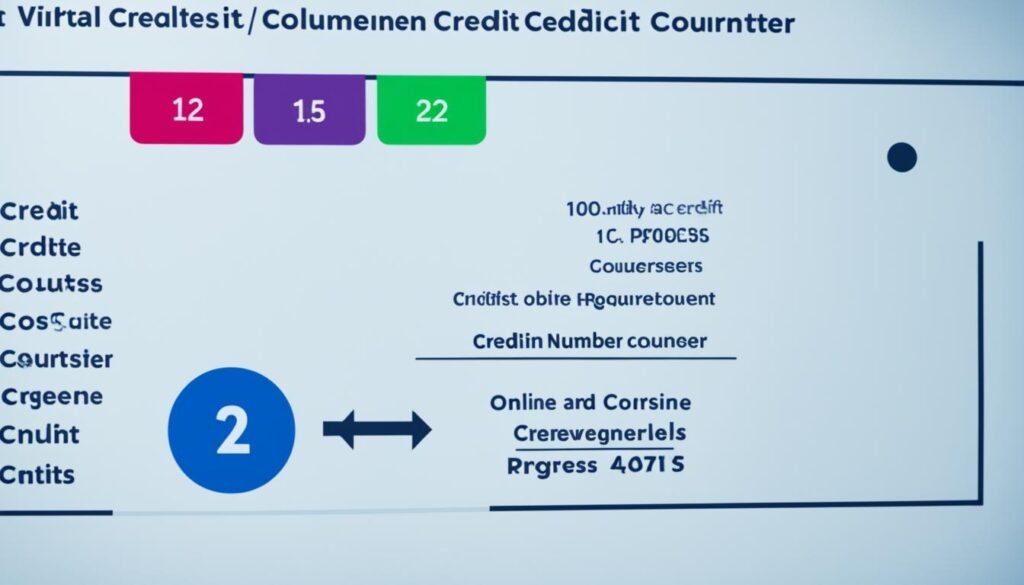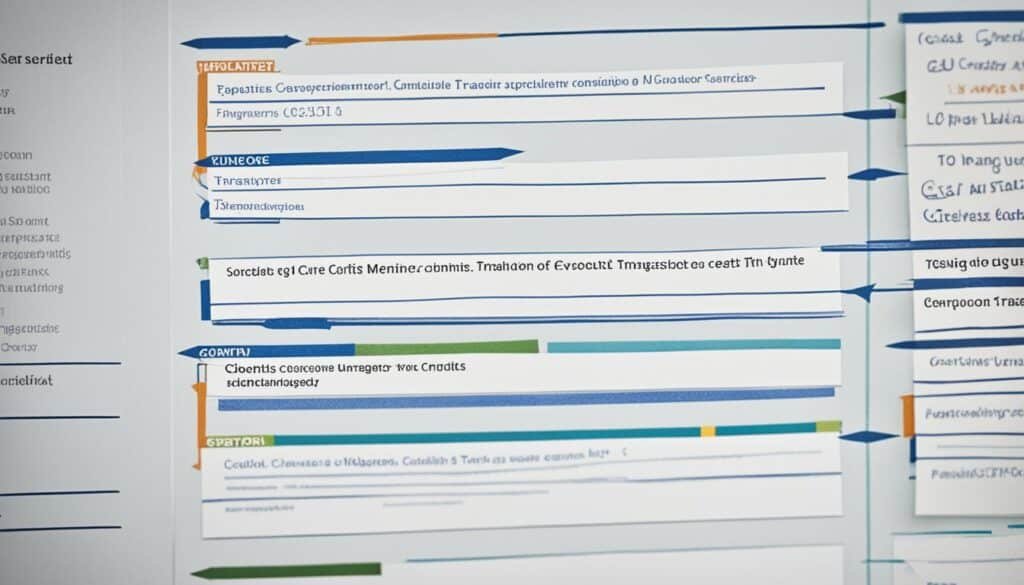University online courses are getting more popular because they offer flexibility and convenience. Students can earn degrees or certifications from reputable schools. This lets learners balance their education with work, family, and other commitments. With improving technology and internet, the field of online learning is growing fast. Now, universities are offering more online degree programs and certificates than ever to meet modern students’ needs.
With online classes, you can do your coursework anytime, anywhere. This includes reading, discussing, taking quizzes, writing papers, and giving presentations. The asynchronous learning format means online classes don’t have to be at a set time each week. This gives you the freedom to study when it fits your schedule but still within the course timeline.
Key Takeaways
- University online courses offer flexibility and convenience to earn degrees or certifications from accredited institutions.
- Online classes allow you to complete coursework virtually and on your own schedule, balancing education with other commitments.
- Asynchronous online courses provide the flexibility to do coursework when it makes sense for you within the course schedule.
- Advancements in technology, course design, and internet availability have driven the growth of online learning.
- Universities are expanding their offerings of online degree programs and certificates to meet the evolving needs of students.
Understanding Online Classes
Online classes let you study without being in a real classroom. You can finish your work from anywhere. This is great if you are busy with a job or family. You can do your work and study on your own time.
Flexibility and Convenience
On a campus, you get stuck to a semester plan. This means you might have to wait a while before starting a new degree. However, with online classes, you can start any time during the year. This gives you more freedom to choose when to start studying.
Difference from Face-to-Face Classes
Online classes are different because they happen on the internet. You don’t go to a real class with a teacher and classmates. Instead, you learn and talk online. You hand in work and talk to your teacher on your computer or phone.
Asynchronous Learning Format
In online classes, there is no set time for everyone to meet. This means you can work on your lessons whenever you want. It’s a great way to study that really fits into your life.
You’ll have assignments, just not in a physical classroom. You might need to read, take tests, write papers, or give presentations. But all of this is done online. You can use an online library and ask your teacher for help at any time.
Expectations in an Online Class

Starting online learning means knowing what you’ll face with your virtual assignments and resources. You’ll also have to look into the instructor support and guidance you can get. Knowing all this will make your online learning adventure smoother.
Virtual Assignments and Resources
Your online tasks will feel like the work you do in a physical classroom. But, these tasks will all be done through the internet. You won’t just talk in class; you’ll use online forums for discussions. You’ll also find readings, online resource materials, quizzes, and other types of tasks.
Access to a vast virtual library and 24/7 chat help is common. This helps a lot if you’re doing work late at night or early in the morning.
Instructor Support and Guidance
Don’t forget, each class will have an instructor ready to help you. They know a lot about their subject and can show you how it fits into the real world.
Online College Community

Working from anywhere is great, but sometimes you need a bit of help. That’s where a strong online college community steps in. They guide new students in picking the right degree. Once you’re in, there’s an advisor ready to support you through your journey. They help with time management, suggest resources, and are there for any questions.
Student Support Services
Online classes come with teachers just waiting to help you understand more. Plus, there’s a cool online space where you can meet classmates, enjoy extracurricular activities, and just have fun.
Extracurricular Activities
Through experiential learning opportunities, you’ll do real projects to hone your skills.
University Online Courses: Credit Requirements

The credits you’ll need to graduate from college can vary a lot. It depends on what you’re studying. Knowing how many credits you need for each degree level is very helpful. It lets you plan your studies well and use your time and money wisely.
Associate Degree
Most associate degrees need about 60 credits. That’s like taking 20 classes. It takes two years to finish this degree. It gives you a good start in your field. Also, it can help you get ready for a bachelor’s degree program.
Bachelor’s Degree
A bachelor’s degree usually requires 120 credits. You’d take about 40 classes. This degree lasts four years. It helps you become an expert in your chosen field. You’ll learn a lot and gain the skills you need for your career.
Master’s Degree
For a master’s degree, you might need 30 to 60 credits. That’s 10 to 20 classes. It depends on the program. With this degree, you become even more skilled and knowledgeable. It can lead to better job opportunities.
Already attended college before? You might be able to use your old credits towards a new online degree. This can shorten your study time and reduce costs. Having this option is great for people with some college experience.
Transfer Credits and Prior Learning

If you’ve been to college before, you can bring your old transfer credits. This can change how long you’re in school and what it costs. You might have 75% of your degree done right from the start. Plus, if you have other types of learning, like from certifications or the military, you can move even faster.
This trick of transferring credits and using what you know can really cut down on how much time and money you spend getting your degree online. By using what you’ve already learned, you might finish your degree quicker than you thought. This way, you can put your focus on what’s left to do. It’s a smart move that could save you a lot of effort and cash.
| Credential | Potential Transfer Credits |
|---|---|
| Associate Degree | Up to 60 credits |
| Bachelor’s Degree | Up to 90 credits |
| Professional Certifications | 3-12 credits per certification |
| Military Education | Varies based on training and experience |
Using transfer credits and prior learning cuts down on the time and money you spend on your online degree. It makes getting further education easier for anyone who’s been in school or has gained experience at work.
Part-Time or Full-Time Enrollment

At Southern New Hampshire University (SNHU), taking two online classes each term is like being a full-time student. It’s not a lot if you’re a part-time student looking to speed up your degree. Before you commit, make sure you check what counts as full-time or part-time at other schools. Also, see how your financial aid could change based on your choice.
Academic Rigor in Online Courses

Online classes work hard to be as enriching as in-person ones. They mix academic rigor with strong support. This way, you get the best of both worlds. Faculty, experts in their fields, guide and challenge you.
Supportive Resources
Knowing your supportive resources is crucial for online success. Having access to academic advisors and 24/7 tutoring makes a big difference. It can transform a tough course into one where you excel.
Time Management Strategies
Time management is key for doing well online. Setting priorities, making a schedule, and getting ready for projects are smart methods. They keep you organized and help maximize your learning.
Online Degree Program Formats

Looking at university online courses, it’s key to know the different formats. Students should understand the differences between synchronous and asynchronous courses. They should also know what hybrid and blended formats offer.
Synchronous and Asynchronous
In synchronous courses, instructors and students are online at the same time. This setup is like a webinar. It allows for instant discussions and teamwork, making learning more dynamic. On the other hand, asynchronous courses don’t need everyone to be online together. Students can work on their own time, fitting their studies around their schedules.
Hybrid and Blended Courses
Hybrid or blended courses mix traditional face-to-face with online learning. They have some in-person meetings and some online work. This mix offers students the best of both worlds. They get the chance to meet their peers and teachers in person. They also enjoy the flexibility of completing some tasks online.
Accreditation for Online Programs

Choosing an accredited online program is important. Students must check if the school is accredited by a recognized organization. This can be the U.S. Department of Education or the nonprofit Council for Higher Education Accreditation. This accreditation shows that the program has met high standards of quality and endurance.
Regional and National Accreditation
Regional agencies decide if a school is regionally accredited. This type of accreditation is well-known and respected. National accreditation is different. It’s given to schools with similar focuses, like vocational or technical schools.
Importance of Accreditation
Employers look for candidates with degrees from accredited programs. They may not recognize the school name, but knowing it’s accredited gives them confidence. Accreditation means a program meets high educational standards, providing quality education.
Choosing an Online Undergraduate Major
When picking an online undergraduate major, students should look at what’s popular. They should also think about the jobs they could get with their degree. Last year, the top six majors were business, health, social sciences, biological sciences, psychology, and engineering.
Popular Majors and Career Prospects
Getting a bachelor’s in engineering leads to high starting pay. So, engineering majors often find good jobs. But, it’s not all about what’s big or makes the most money. It’s smart to choose something you love and see a future in.
Want to study business? You could do lots of different things, from marketing to managing finances. Jobs in health, like nursing, are always needed. And if you’re into social sciences and history, jobs in teaching, working for the government, or at a non-profit could be yours.
The key is finding a major that you’re excited about and that leads to a good job. Look at what different majors offer and see which one fits you best. This thoughtful approach helps students pick a path to future success.
Structure of Online Degree Programs

Online courses need students to log in to a learning management system, often called an LMS. This LMS is like a virtual classroom. Here, students can do many things. They can look at course materials and check how well they’re doing. The online degree program structure has many parts that make learning and taking part fun.
Learning Management Systems (LMS)
The learning management systems used online are made to be clear and easy to use. These systems let students look at course materials, hand in their work, talk in discussions, and keep track of their grades. And they can do all this using their own computers or smartphones.
Course Formats and Interactions
Online degree courses come in different types. Some don’t need everyone to be online at the same time. These are called asynchronous courses. Others, like synchronous courses, need everyone to meet online at set times. There’s also a mix, or hybrid, of online and face-to-face classes. No matter the type, students get to talk to each other and their teachers. This can happen through forums, social media, video chats, and more. It helps everyone learn together better.
Also Read : 10 Best Universities In The World For Scholarships
Conclusion
University online courses are all about flexibility and convenience. They let you earn degrees or certifications from top schools without ever leaving the house. Thanks to tech improvements and better internet, online education has become very popular. It means you can study while balancing work and family, all at your own pace.
Think about where you want your education to take you. University online courses can be the start of something big for your career and personal growth. They’re perfect for anyone who needs to fit studying around their life. These courses offer distance learning and flexible learning.
The demand for online education is only going up. This means more opportunities for anyone wanting to learn from home. So, don’t miss your chance to learn and grow. Take full advantage of what online courses can offer you.
FAQs
Q: What are university online courses?
A: University online courses are courses offered by universities that can be taken over the internet. These courses provide the flexibility for learners to study at their own pace without being confined to a physical campus.
Q: How do university online courses differ from traditional on-campus courses?
A: University online courses offer flexible scheduling, allowing learners to study at their own pace and convenience. On the other hand, traditional on-campus courses require learners to attend classes in person at specific times.
Q: Are there tuition fees associated with university online courses?
A: Yes, there are tuition fees associated with university online courses. The tuition fees may vary depending on the institution and the specific course or program being pursued.
Q: Can I pursue undergraduate and graduate degrees through university online courses?
A: Yes, many universities offer undergraduate and graduate programs through online courses. Learners can pursue various degrees and certificates in a wide range of fields.
Q: Do university online courses offer free options?
A: Some universities offer free online courses as part of their commitment to providing education to a wider audience. These free online courses may not lead to a degree or certificate but can provide valuable knowledge and skills.
Q: How can university online courses help in advancing my career?
A: University online courses offer the opportunity to build valuable skills, pursue advanced degrees, and stay up-to-date with industry trends. These courses can help individuals advance their careers and explore new opportunities.
Q: Are university online courses taught by qualified professors?
A: Yes, university online courses are typically taught by experienced and qualified professors who are experts in their respective fields. These professors deliver high-quality education through online platforms.
Source Links
- https://www.snhu.edu/about-us/newsroom/education/what-to-expect-as-an-online-student
- https://www.fordham.edu/about/leadership-and-administration/administrative-offices/office-of-the-provost/provost-office-units/online-learning/types-of-online-learning/
- https://www.usnews.com/education/online-education






